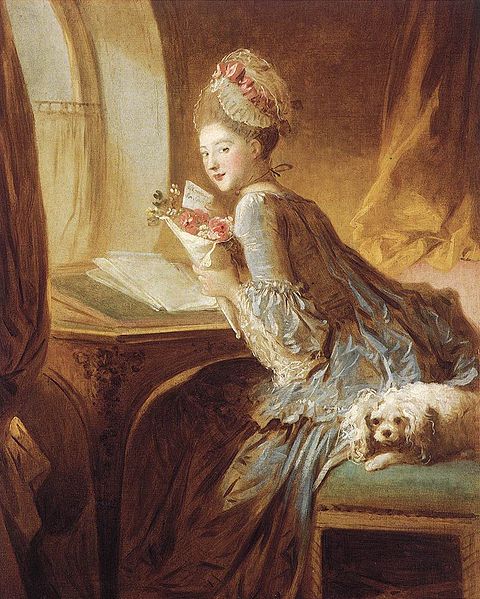
Le billet doux ou la lettre d’amour (circa 1775), by Jean-Honoré Fragonard (1732-1806)
source: Wikimedia Commons/The Metropolitan Museum of Art, New York
A borrowing from French, the noun poulet denotes a love letter. It is first recorded in A Dialogue between Dr. Sherlock, the King of France, the great Turk, and Dr. Oates (1691), by the Church of England clergyman and religious controversialist William Sherlock (died 1707):
Dr. Sherlock. I’le undertake to make Captain Tom, the most Dreadful, the most Soveraign, and the most Divine Thing upon Earth.
Dr. Oates. I would only know which way you would confer that Power upon him; for why should not I convey it as well as you? Will you send it in a Basket as a Token of your pure Love to absolute Soveraignty, or in a Billet Dieu [sic], or in a Poulet as I us’d to do to the Nuns at Salamanca?
The literal meanings of French poulet are chicken and chicken meat. Its first known figurative use, in the general sense of written message, is from Le Pelerinage de mariage, a farce dating back to 1556:
Voecy un terible poullaict (This is a terrible poulet)
The word is first attested in the sense of love letter in the 1588 edition of Essais by the French philosopher Michel Eyquem de Montaigne (1533-92):
(1842 edition of the 1686 translation by Charles Cotton (1630-87)):
Of the same sheet of paper whereon the judge has but just written a sentence against an adulterer, he steals a piece whereon to write a love-letter to his companion’s wife.
original text (Villey-Saulnier edition):
De ce mesme papier où il vient d’escrire l’arrest de condemnation contre un adultere, le juge en desrobe un lopin pour en faire un poulet à la femme de son compaignon.
This figurative use probably arose from the fact that when folding these messages, one would make two tips resembling chicken wings. This seems to be supported by the following from L’École des maris (The School for Husbands, a comedy first performed in 1661), by the French playwright and actor Molière (Jean-Baptiste Poquelin – 1622-73):
I saw a young man at yonder turning, who first came, most unexpectedly, to wish me good morning, on the part of this impertinent man, and then threw right into my chamber a box, enclosing a sealed letter in (the form of a) chicken.
French text (1819 edition):
J’ai vu dans ce détour un jeune homme paroître,
Qui d’abord, de la part de cet impertinent,
Est venu me donner un bonjour surprenant,
Et m’a, droit dans ma chambre, une boîte jetée
Qui renferme une lettre en poulet cachetée.
Interestingly, the English poet and playwright William Shakespeare (1564-1616) used a similar metaphor in Loues Labour’s lost (around 1595):
(Folio 1, 1623)
– Clowne. I haue a Letter from Monsier Berowne,
To one Lady Rosaline.
– Queen. O thy letter, thy letter: He’s a good friend of mine.
Stand a side good bearer.
Boyet, you can carue,
Breake vp this Capon.
– Boyet. I am bound to serue.
In Annotations by Sam. Johnson & Geo. Steevens, and the various commentators, upon Love’s Labour’s Lost (London, 1787), the comments on this passage include the following:
Henry IV.¹ consulting with Sully² about his marriage, says, “My niece of Guise would please me best, notwithstanding the malicious reports, that she loves poulets in paper, better than in a fricasée.”—A message is called a cold pigeon, in the letter concerning the entertainments at Killingworth-Castle.
(¹ Henry IV (1553-1610), king of France – ² the French statesman Maximilien de Béthune (1560-1641), duc de Sully)
The letter in question is a contemporary account of the summer 1575 entertainment of Elizabeth I by the Earl of Leicester at his castle, titled A Letter: Whearin, part of the entertainment vntoo the Queenz Maiesty, at Killing woorth Castl, in warwik Sheer, in this soomerz Progress 1575. iz signified: from a freend officer attendant in Coourt, vntoo hiz fréend a Citizen, and Merchaunt of London (London, 1575), ascribed to Robert Langham (circa 1535-1579/80):
Sumtime get I too Master Pinner, by my feyth a worshipfull Gentlman, and az carefull for hiz charge az ony her highnes hath: thear find I allway good store of very good viaunds: we eat & be mery, thank God & the Queen. Him self in feeding very temperat & moderat az ye shall see ony: and yet by yoor leaue of a dish, az a colld Pigeō or so, that hath cum to him at meat more then he lookt for, I haue seen him éen so by & by surfyt, az he hath pluct of hiz napkin, wyept hiz knife, & eat not a morsell more: lyke inoough too stik in hiz stomak a too dayz after: (Sum hard message from the higher officerz, perceyue ye me?) Upon search, hiz faithfull dealing & diligens hath foound him fautles.
in contemporary English:
Sometimes I get to Master Pinner, by my faith a worshipful Gentleman, and as careful for his charge as any her Highness has. There I find always good store of very good viands; we eat and be merry, thank God and the Queen. Himself in feeding very temperate and moderate as you shall see any; and yet, by your leave, of a dish, as a cold pigeon or so, that has come to him at meat more than he looked for, I have seen him even so by and by surfeit, as he has plucked off his napkin, wiped his knife, and eat not a morsel more; like enough to stick in his stomach two days after: (some hard message from the higher officers; perceive ye me?) Upon search, his faithful dealing and diligence has found him faultless.
